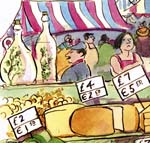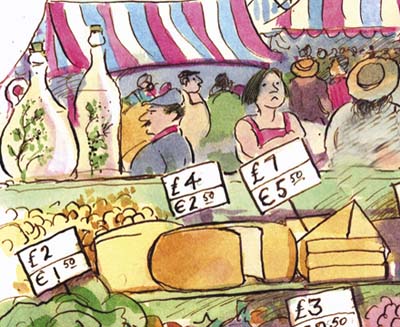Living in France: The Country Life guide
Moving to rural France and doing up an old wreck is an enduring British dream. We get the lowdown of the practicalities of making the move a success.


Exquisite houses, the beauty of Nature, and how to get the most from your life, straight to your inbox.
You are now subscribed
Your newsletter sign-up was successful
L'art de vivre. It's a French expression. In France, you can get a mansion for practically nothing, the climate is beyond compare, the food is ambrosial, and the wine! Mon Dieu, the wine! Statistically, however, about half of the shivering expatriates who move to France will return within two years. Buyer, beware. Vive la difference: that's a French expression, too.
The weather is wonderful It's a huge country. You can sunbathe in the morning and ski in the afternoon. You can camp, paraglide or get naked in a bewildering variety of landscapes. And that weather means delicious food-a whole new menu, and a longer life expectancy. Neighbours will proffer you their own honey and figs. No morning spent in any French market is ever wasted. There is no downside, other than the language barrier, which led to a friend of mine returning to her kitchen with lamb's brains when she'd hoped for chops.
We can all speak French (sort of) Well, more readily, perhaps, than Czech or Bulgarian. But really to speak it, with all the nuances of which the Academie Française is so fiercely proud, is quite another matter. A subjunctive or a past historic can twist a meaning completely. And unless you're eight years old, learning those will take two decades, during which you'll be suffering the consequences. Any idiot can get by in the boulangerie, but when your equally monolingual dog eats the neighbour's cat, then what? And that's leaving aside the solicitor, the mechanic, the taxman... French property is cheap Not as cheap as it was. Nor is the market that straightforward, especially at the other end. If you sell a property as a French tax resident, it's likely that you'll immediately be required to host a Controle Fiscale inspection. This takes typically three months, and will forensically examine all your professional and private financial records for the previous decade. If you're not a tax resident, the State will nonetheless demand a beefy sum in security, in case it discovers that you owe it something later. A security that, mark you, it holds for a further decade. And France itself is not that cheap. Many would argue that the cost of living there is higher than in the UK.
Historic houses are plentiful As is the time that will be required to bring them up to spec. Restoration is not for the faint-hearted, nor faint-walleted. And there's that language barrier again: one friend was stymied when trying to explain an issue to a plumber: ‘J'ai une problème avec mon arrête-coq.' Even if you're a builder, and have nothing else to do, make sure that you get a written estimate from a professional before you jump in.
There's so much space There is indeed. Have you ever lived in the middle of nowhere in the middle of winter? You might consider renting before you relocate. The experience can be an eye-opener. You'll need to offset the peace and quiet of a rural idyll against the reality of life in midwinter in la France profonde. Try before you buy. Ennui: it's a French word.
There's good State education This is undeniably true, but bear in mind that French senior schools do tend to favour the more able students. Remember, too, that le BAC is the French Baccalaureate, and not its international equivalent.
...and good State healthcare The expatriates are unanimous: the French healthcare system is wonderfully efficient. To access it, you must contribute to the social-security system, calculated as a percentage of your taxable income. You may then register at the local Sécurité Sociale office or health-insurance office (Caisse Primaire d'Assurance Maladie). Doctor's appointments are, in general, a piece of cake to arrange-you can normally get one on the same day that you call the surgery. However, one has to pay for treatment upfront, and then claim the cost back from the authorities using a green Carte Vitale. Costs are not always reimbursed in full, so top-up health insurance (known as a complémentaire) is highly advisable. French pharmacies are privately owned, and there's little available in the super-markets other than condoms.
Exquisite houses, the beauty of Nature, and how to get the most from your life, straight to your inbox.

The roads are well made, and not too busy Except around Paris on a Friday afternoon. But don't, whatever you do, try to export your car. It's simply not worth it. It's the EU, so you can find a job Mais non. British qualifications and experience cut little mustard, as does the European right to work. Unemployment in France is higher than in the UK. If you don't speak good French, your chances as a foreigner of finding a decent paying job are slim unless you have contacts or are in a big town or city. Teenagers' jobs are even more elusive-newspaper-delivery boys don't exist and the grape harvest begins after the schools go back. The French administration hasn't much moved on from Napoleon's Civil Code and is keen on protecting its own, operating with rigid, 18th-century high-handedness. You'll be shocked at how many cheques you write each month to various social-security departments. After five years of dutifully submitting stamped, signed and officially translated copies of every piece of paper you have ever handled, you'll get the message.
I know! I'll start my own business
Consider the potentially hefty business-taxation rates, and then a social security obligation of up to 45% of the remaining net after a few deductions. Perhaps there really is no French word for entrepreneur. To the hordes who say ‘we'll earn our living by renting out a couple of rooms or gîtes': the majority of those who've done it advise against it as a sole source of income. At the very least, write a business plan.
What is my product? Is there a market for it? Where will my customers come from? What will my marketing costs be? Decide what plan B is. Writing yet another Peter Mayle-esque blockbuster about relocating to France is subject to the law of diminishing returns. A visit to an accountant is like spilling alphabet soup. Having chosen from various business options (EI, EIRL, SARL, EURL), you have then to register with URSSAF to obtain your SIREN from INSEE. The French do rather need a Plain English campaign. ‘We're going to retire to France. We feel we'll be very happy there'
If you've spent extended periods of time in a particular region and feel comfortable there, then the chances are that you'll spend a happy retirement there, too. But attention to practical matters is key.
Take professional advice on pension, tax and inheritance issues that might affect you and your partner and be aware that State healthcare will only be available to you when you reach the statutory retirement age or have been in France for five years-whichever comes first. Contact the International Pension Centre (0191-218 7777) to check arrangements before your move, and find out how your pension can be paid to you in France.
The great unspoken truth-that one of you has to go first-means that the surviving spouse will need to have access to sufficient means of support (financial, practical and social) to see them through. It's a sobering thought, but one that deserves attention. French people are very polite and have a formal, old-world charm about them
France is going bust. The economy is in a spiralling deficit. As a foreigner, you risk being overcharged because you ‘can afford it'. This is known as le prix Anglais. Oh, and one last word of warning. The French strip their houses when they sell. Thirty light fittings and lampshades will entail a second mortgage.
to Country Life and save £60
Country Life is unlike any other magazine: the only glossy weekly on the newsstand and the only magazine that has been guest-edited by His Majesty The King not once, but twice. It is a celebration of modern rural life and all its diverse joys and pleasures — that was first published in Queen Victoria's Diamond Jubilee year. Our eclectic mixture of witty and informative content — from the most up-to-date property news and commentary and a coveted glimpse inside some of the UK's best houses and gardens, to gardening, the arts and interior design, written by experts in their field — still cannot be found in print or online, anywhere else.
